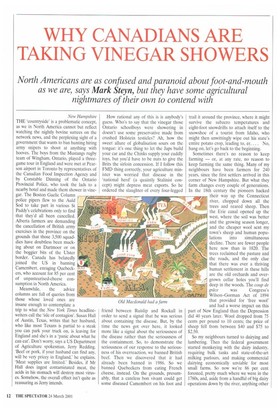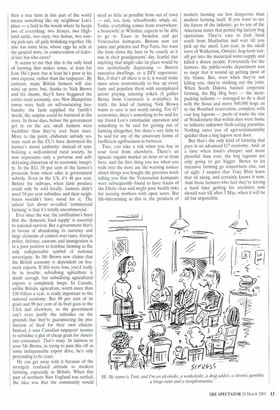WHY CANADIANS ARE TAKING VINEGAR SHOWERS
North Americans are as confused and paranoid about foot-and-mouth
as we are, says Mark Steyn, but they have some agricultural
nightmares of their own to contend with
New Hampshire THE 'countryside' is a problematic concept, as we in North America cannot but reflect watching the nightly bovine suttees on the network news, and the perplexing sight of a government that wants to ban hunting hiring army snipers to shoot at anything with hooves. The boys from the Mustangs rugby team of Wingham, Ontario, played a threegame tour in England and were met at Pearson airport in Toronto by representatives of the Canadian Food Inspection Agency and by Constable Dinning of the Ontario Provincial Police, who took the lads to a nearby hotel and made them shower in vinegar. The Boston Gaelic Column police pipers flew to the Auld Sod to take part in various St Paddy's celebrations only to find that they'd all been cancelled. Alberta farmers are demanding the cancellation of British army exercises in the province on the grounds that those 3,500 squaddies have doubtless been mucking about on Dartmoor or on the boggier bits of the Ulster border. Canada has belatedly joined the US in banning Camembert, enraging Quebeckers, who account for 85 per cent of unpasteurised-cheese consumption in North America.
Meanwhile, the advice columns are full of queries from those whose loved ones are insane enough to contemplate a trip to what the New York Times headlinewriters call the 'isle of contagion'. Susan Hall of Austin, Texas, writes that her husband, who like most Texans is partial to a steak you can park your truck on, is leaving for England and she's in a 'panic about what he can eat'. Don't worry, says a US Department of Agriculture spokesman, Jerry Redding. 'Beef or pork, if your husband can find any, will be very pricey in England,' he explains. 'Meat supplies are limited.' Besides, if Mr Hall does ingest contaminated meat, the acids in his stomach will destroy most viruses. Somehow, the overall effect isn't quite as reassuring as Jerry intends.
How rational any of this is is anybody's guess. Who's to say that the vinegar those Ontario schoolboys were showering in doesn't use some preservative made from crushed Holstein testicles? Ah, how the sweet allure of globalisation sours on the tongue: it's one thing to let the Japs build your car and the Chinks supply your cuddly toys, but you'd have to be nuts to give the Brits the sirloin concession. If I follow this FMD thing correctly, your agriculture minister was worried that disease in the 'national herd' (a quaintly Stalinist concept) might depress meat exports. So he ordered the slaughter of cx cry four-legged friend between Ruislip and Rockall in order to send a signal that he was serious about containing the disease. But, by the time the news got over here, it looked more like a signal about the seriousness of the disease rather than the seriousness of the containment. So, to demonstrate the seriousness of our response to the seriousness of his overreaction, we banned British beef. Then we discovered that it had already been banned in 1986. So we banned Quebeckers from eating French cheese, instead. On the grounds, presumably, that a careless bon vivant could get some diseased Camembert on his foot and trail it around the province, where it might survive the subzero temperatures and eight-foot snowdrifts to attach itself to the snowshoe of a tourist from Idaho, who might then unwittingly wipe out his state's entire potato crop, leading to, er.... No, hang on, let's go back to the beginning.
Sometimes there's no reason to keep farming — or, at any rate, no reason to keep farming the same thing. Many of my neighbours have been farmers for 240 years, since the first settlers arrived in this corner of New Hampshire. But what they farm changes every couple of generations. In the 18th century the pioneers hacked their way up the Connecticut river, chopped down all the trees and reared sheep. Then the Erie canal opened up the west, where the soil was better and the growing season longer, and the cheaper wool sent my town's sheep and human populations into simultaneous decline. There are fewer people here now than in 1820. The trees reclaimed the pasture and the roads, and the only clue that there was ever a thriving human settlement in these hills are the old orchards and overgrown cellar holes you'll find deep in the woods. The coup de grace was Congress's Wilson–Gorman Act of 1894 that provided for 'free wool' and had a worse impact on this part of New England than the Depression did 40 years later. Wool dropped from 75 cents per pound to 10 cents; the price of sheep fell from between $40 and $75 to $2.50.
So my neighbours turned to dairying and lumbering. Then the federal government started monkeying with the dairy industry, requiring bulk tanks and state-of-the-art milking parlours, and making commercial dairying economically unviable for most small farms. So now we're 86 per cent forested, pretty much where we were in the 1760s, and, aside from a handful of big dairy operations down by the river, anything other than a tree farm in this part of the world means something like my neighbour Lon's place — a field in the woods where he keeps two of everything: two Jerseys, two Highland cattle, two oxen, two horses, two rusting pick-ups, all gaily frolicking together. He also has some hens, whose eggs he sells at the general store, in contravention of federal law: but who cares?
It seems to me that this is the only kind of farming that makes sense, at least for Lon. He's poor, but at least he's poor at his own expense, rather than the taxpayers'. By contrast, many British farmers will also wind up poor, but, thanks to Nick Brown and his chums, they'll have beggared the entire rural economy, too. New Hampshire towns were built on self-sustaining husbandry: the farm supplied the family's needs; the surplus could be bartered at the store. In those days, before the government got in on the act, small farmers were wealthier than they've ever been since. More to the point, elaborate subsidy systems such as the EU's have destroyed the farmer's moral authority: instead of symbolising a well-ordered rural society, he now represents only a perverse and selfdefeating distortion of its economic integrity. In the EU, 58 per cent of the farmer's proceeds from wheat sales is government subsidy. Even in the US, it's 46 per cent. Before the railways, when farm produce could only be sold locally, farmers didn't need 58 per cent subsidies, and their neighbours wouldn't have stood for it. The salient fact about so-called 'commercial farming' is that it's totally uncommercial.
Ever since the war, the justification's been that the 'domestic food supply' is essential to national survival. But a government that's in favour of abandoning its currency and large elements of control over taxes, foreign policy, defence, customs and immigration is in a poor position to fetishise farming as the only indispensable symbol of national sovereignty. So Mr Brown now claims that the British economy is dependent on livestock exports. If this were true, you'd really be in trouble: subsidising agriculture is dumb enough, but subsidising agricultural exports is completely loopy. In Canada, unlike Britain, apiculture, worth more than $30 billion a year, is really important to the national economy. But 80 per cent of its grain and 90 per cent of its beef goes to the USA and elsewhere, so the government can't even justify the, subsidies on the grounds that they're guaranteeing the production of food for their own citizens. Instead, it uses Canadian taxpayers' monies to subsidise a glut of cheap grain for American consumers. That's crazy. In fairness to your Mr Brown, in trying to pass this off as some indispensable export drive, he's only pretending to be crazy.
He can get away with it because of the strangely confused attitude to modern farming, especially in Britain. When this part of northern New England was settled, the idea was that the community would
need as little as possible from out of town — salt, tea, iron, schoolbooks, whale oil. Today, everything comes from everywhere: a housewife in Wiltshire expects to be able to go to Tesco in Swindon and get Venezuelan kumquats. Britons now eat pasta and polenta and Pop-Tarts, but want the farm down the lane to be exactly as it was in their grandparents' day, fearful that anything that might take its place would be too aesthetically depressing — Barrett executive dwellings, or a DIY superstore. But, if that's all there is to it, it would make more sense economically to buy up every farm and populate them with unemployed actors playing amusing yokels (I gather Benny from Crossroads is available). In truth, the kind of farming Nick Brown wants to save is not worth saving. For G7 economies, there's something to be said for my friend Lon's ramshackle operation and something to be said for getting out of farming altogether, but there's very little to be said for any of the unsavoury forms of inefficient agribusiness in between.
True, you take a risk when you buy in your food from elsewhere. There's an upscale organic market an hour or so from here, and the first thing you see when you walk into the store are the warning notices about things you bought the previous week telling you that the Venezuelan kumquats were subsequently found to have traces of the Ebola virus and might pose health risks for nursing mothers with open sores. But life-threatening as this is, the products of modern farming are less dangerous than modern farming itself. If you want to see the future of the industry, go to any of the American states that permit big factory hog operations. They're easy to find: head south from Manhattan and wait till you pick up the smell. Last year, in the small town of Walkerton, Ontario, hog-farm runoff got into the municipal water-supply and killed a dozen people. Fortunately for the farmers, the public-works department was so inept that it wound up getting most of the blame. But, even when they're not killing you, they're stinking out the joint. When South Dakota banned corporate farming, the Big Hog boys — the meatpacking industry — managed to do a deal with the Sioux and move 860,000 hogs on to the Rosebud reservation, complete with vast hog lagoons — pools of waste the size of Windermere that within days were home to hitherto unknown flesh-eating parasites. Nothing cures you of agri-sentimentality quicker than a hog lagoon next door.
But that's the only kind of farming that pays in an advanced G7 economy. And, at a time when food's cheaper and more plentiful than ever, the hog lagoons are only going to get bigger. Better to let intensive farming go somewhere else, out of sight. I suspect that Tony Blair knew that all along, and certainly knows it now. And those farmers who feel they're having a hard time getting his attention now should wait till after 3 May, when it will be all but impossible.















































































 Previous page
Previous page